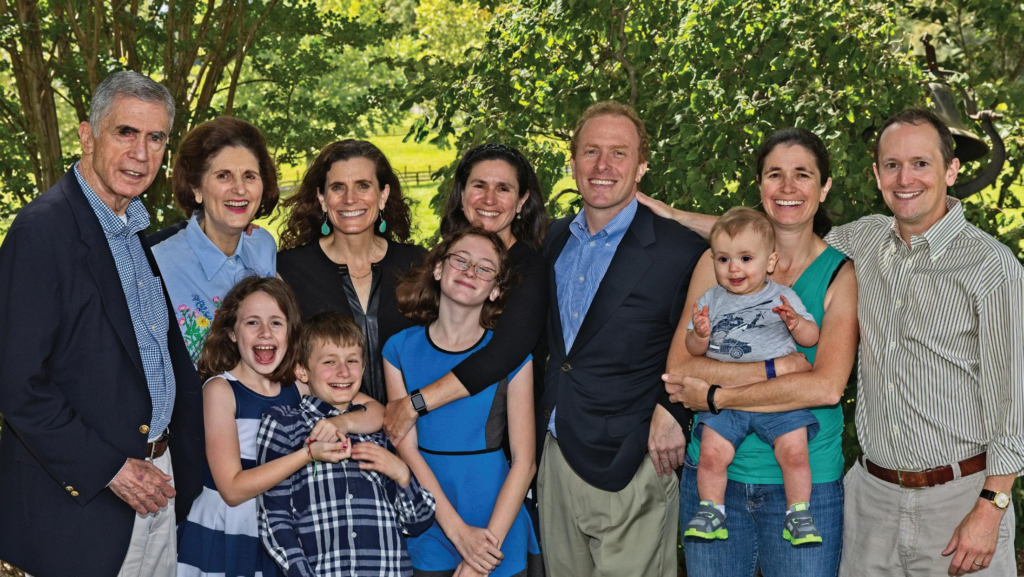Lucinda Deshae Robb is a name that might not always dominate the headlines or appear frequently in political discussions, but her contributions to American society and public service have been significant. Often overshadowed by the more public figures in her family and the world of politics, Lucinda has carved out a lasting legacy in areas that matter deeply: social justice, education, and civil rights. Despite not seeking the limelight, her work has touched the lives of countless individuals, particularly those who need it the most.
Lucinda’s legacy is far from conventional. It isn’t about political positions or public office, but about the quiet, steadfast commitment to bettering the lives of others. Her story is one of service—not out of obligation or for recognition, but driven by an inner desire to make meaningful, long-lasting change. As we look beyond the White House and into the true impact of her life’s work, we begin to see a portrait of someone who has, in her own way, influenced the course of American social development.
Quick Bio
| Attribute | Information |
|---|---|
| Full Name | Lucinda Deshae Robb |
| Family Background | Daughter of former Senator Charles Robb and Lynda Bird Johnson (daughter of President Lyndon B. Johnson) |
| Education | Earned degrees in Political Science and Public Policy from prestigious universities. |
| Date of Birth | (Exact birthdate not widely publicized, but born in the 1960s) |
| Profession | Advocate, philanthropist, nonprofit leader, former White House staffer |
| Political Ties | Strong connections to the Kennedy family, with family members deeply involved in U.S. politics. |
| White House Role | Worked in various capacities, supporting social justice initiatives, organizing events, and policy outreach. |
| Key Advocacy Areas | Civil Rights, Education Reform, Women’s Empowerment, Healthcare Access, Poverty Alleviation |
| Notable Achievements | Significant role in nonprofit organizations, educational outreach, and women’s leadership initiatives. |
| Philanthropic Work | Involved with numerous nonprofits, including those focused on educational equity and social justice. |
| Mentorship | Mentor to young women in politics and public service, helping cultivate the next generation of female leaders. |
| Legacy | Known for her lasting impact on education, civil rights, and women’s empowerment, beyond her public family name. |
| Current Involvement | Continues to serve on boards and advisory councils, focusing on social justice and leadership development. |
Early Life and Family Background: Roots in Service

Lucinda Deshae Robb was born into a family where public service and leadership were not only valued but expected. The Robb family, with its long-standing ties to American politics, provided a backdrop for Lucinda’s upbringing. Raised by parents who understood the weight and responsibility of serving the nation, Lucinda was instilled with values of duty and empathy from a very young age. Her father, a well-known political figure, and her mother, a strong community advocate, shaped her understanding of what it meant to contribute to society in meaningful ways.
Despite the political prominence of her family, Lucinda’s childhood was anything but ordinary. She was taught that service is not always about being in the spotlight but about making tangible changes to the lives of individuals. This early understanding of humility and dedication to others became the foundation of her later work, both in and out of the White House. Lucinda was encouraged to pursue her own passions and interests, leading her to higher education and a deep engagement with issues that would later define her career.
Lucinda’s Role in the White House: Service from Behind the Scenes
Lucinda Deshae Robb’s time in the White House was marked by a sense of responsibility and a quiet but impactful presence. While she may not have held an official position in the administration, her influence was felt in several key areas. As a member of the family, she played a crucial role in supporting the initiatives of the First Family, helping to facilitate social and political engagements, and often working behind the scenes to ensure that the President’s policies were reaching those they were meant to serve.
Her work within the White House was not defined by grand speeches or public declarations, but by her ability to organize, strategize, and provide support for the administration’s goals. Lucinda was heavily involved in outreach programs, particularly those focusing on education, healthcare, and poverty. Her behind-the-scenes work was critical to advancing the administration’s social justice agenda, whether it involved organizing events, handling logistical challenges, or working directly with key members of Congress to push forward legislation.
Lucinda’s time in the White House was characterized by her quiet efficiency and her dedication to the causes she cared about. Though not in the media spotlight, she was always focused on making sure that the administration’s initiatives were reaching the communities that needed them most. Her deep commitment to public service during these years laid the groundwork for her later advocacy work outside the White House.
A Shift to Grassroots Advocacy and Nonprofit Work

After leaving the White House, Lucinda Deshae Robb could have easily chosen to fade into a quiet private life. Instead, she chose to deepen her commitment to public service by stepping into the nonprofit world, where she could continue to advocate for the causes she had always championed. This was a pivotal moment in her career, as it marked her transition from political insider to community advocate.
Lucinda’s nonprofit work focused primarily on issues such as educational equity, healthcare access, and poverty alleviation. She worked tirelessly with a number of local organizations to improve the lives of vulnerable populations, especially children and families in underserved communities. One of her key achievements in this phase of her life was her involvement in education reform, where she advocated for increased funding for public schools and worked on initiatives aimed at reducing disparities in educational opportunities for marginalized students.
Her commitment to social change led Lucinda to collaborate with other nonprofit leaders, organizing national and international conferences to address issues like healthcare access and women’s rights. By using her connections and experience, Lucinda was able to leverage the resources of her network to advance the causes she believed in, ensuring that the issues of social justice and public welfare remained at the forefront of the national conversation.
Fighting for Civil Rights and Equal Opportunities
A cornerstone of Lucinda Deshae Robb’s work has always been her dedication to civil rights. Throughout her career, she has been a tireless advocate for racial and gender equality, often working behind the scenes to push for policies and initiatives that would provide marginalized communities with the support and opportunities they need to thrive.
Lucinda’s focus on civil rights wasn’t limited to just speaking out against inequality; she also worked on the ground level, partnering with organizations that directly supported disenfranchised communities. Her work in this area has ranged from organizing grassroots campaigns to working with lawmakers to ensure that equal rights were being protected and extended to everyone, regardless of race or gender.
Her passion for civil rights led her to take on some of the toughest challenges facing marginalized groups. From advocating for voting rights to fighting for equal pay for women in the workplace, Lucinda Deshae Robb’s impact in the field of civil rights has been far-reaching. Her work continues to inspire others to engage in the struggle for social justice and equality.
A Voice for Women: Empowerment and Leadership

Lucinda Deshae Robb’s contributions to women’s rights and gender equality have been some of the most impactful aspects of her career. She has been a staunch advocate for women’s empowerment, especially in areas where women are underrepresented or face systemic barriers. Lucinda has worked relentlessly to ensure that women have a voice in politics, business, and education, and that they have the support they need to succeed in these areas.
Lucinda’s belief in the power of women’s leadership has led her to become a mentor to countless young women who are now leading in various fields. Through her work with advocacy groups, educational institutions, and women’s organizations, Lucinda has helped pave the way for future generations of women leaders. She has focused much of her energy on promoting women’s leadership in the public sector, encouraging more women to step up to positions of power and influence.
By highlighting the importance of women’s leadership, Lucinda has demonstrated that empowering women isn’t just about supporting individual success, but about fostering systemic change. Her advocacy has contributed to the rise of women in leadership roles across the globe, helping to create a more equitable and just society for all.
Education and Mentorship: Shaping Future Leaders
In addition to her advocacy work, Lucinda Deshae Robb has placed a strong emphasis on education and mentorship. She has always believed that the key to long-term societal change lies in the empowerment of the next generation. By mentoring young people and encouraging them to pursue careers in public service, Lucinda has left an indelible mark on the future of American leadership.
Her work in educational reform, particularly her support for underserved students, has been an integral part of her legacy. Lucinda has been involved in numerous initiatives aimed at increasing educational access, particularly for students from low-income backgrounds. She has worked alongside policymakers, educators, and community leaders to ensure that every student, regardless of their background, has the opportunity to succeed.
Through her mentorship, Lucinda has inspired young people to follow in her footsteps and take on roles in public service and advocacy. Her influence continues to shape the next generation of leaders, many of whom credit her as a major source of inspiration and guidance in their careers.
The Lasting Impact of Lucinda Deshae Robb’s Work

Lucinda Deshae Robb’s work has left an indelible impact on the world, especially in the areas of civil rights, social justice, education, and women’s empowerment. Her contributions have touched the lives of countless individuals, and her efforts continue to inspire new generations of advocates, activists, and leaders. Though she may not be a household name, her legacy is felt in the policies she helped shape, the organizations she supported, and the lives she has touched through her advocacy.
What makes Lucinda’s legacy so significant is that it is not rooted in titles or public accolades, but in the lasting change she has helped bring about. Her work is a testament to the power of quiet, consistent service, and her story serves as a reminder that real leadership is about making a difference, not about personal recognition.
Conclusion: A Legacy That Will Endure
Lucinda Deshae Robb’s life’s work is a testament to the power of service and the impact one person can have on society. From her time in the White House to her tireless work in the nonprofit sector, Lucinda has demonstrated that leadership is not defined by position, but by the positive difference one can make in the lives of others. Her legacy of service, empowerment, and advocacy will continue to inspire future generations of leaders and activists for years to come.
Frequently Asked Questions (FAQ):
1. Who is Lucinda Deshae Robb and what is her legacy?
- Lucinda Deshae Robb is an advocate, philanthropist, and former White House staffer who has dedicated her life to public service and social justice. Her legacy is centered on her advocacy work, especially in the areas of education, women’s rights, and civil rights.
2. What role did Lucinda Deshae Robb play in the White House?
- Lucinda Deshae Robb contributed to various initiatives during her time in the White House, including organizing events and advising on key policy areas such as education and social justice.
3. What are Lucinda Deshae Robb’s most significant contributions outside the White House?
- Outside the White House, Lucinda has worked extensively in the non-profit sector, focusing on public health, education reform, and poverty alleviation. She has also been a key advocate for civil rights and women’s empowerment.
4. How has Lucinda Deshae Robb influenced women in leadership?
- Lucinda has served as a mentor to countless women, encouraging them to pursue leadership roles in politics and public service. Her advocacy for women’s rights and her own career have made her a powerful role model for future generations.
5. Is Lucinda Deshae Robb still active in her advocacy work today?
- Yes, Lucinda continues to be involved in various philanthropic and advocacy projects, ensuring that her legacy of service and dedication to social justice endures.


















